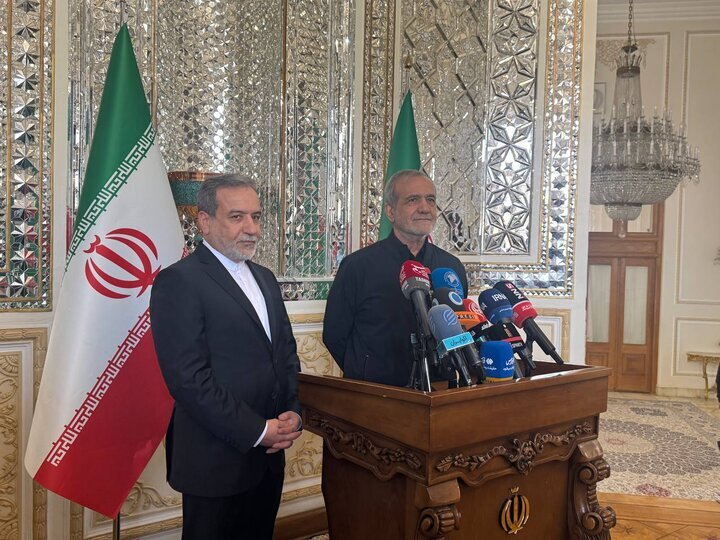Pezeshkian: Iran should pursue defense and diplomacy in tandem

TEHRAN – President Masoud Pezeshkian has stated that, in line with the recommendations of Leader of the Islamic Revolution Ayatollah Seyyed Ali Khamenei, Iran must actively and effectively pursue both the defense-security and diplomatic tracks in the aftermath of the Israeli attack.
President Pezeshkian, during a visit to Iran’s Ministry of Foreign Affairs, stressed the importance of improved relations with neighboring countries and called on diplomats to adopt a more proactive stance.
He referenced Ayatollah Khamenei’s guidance that Iranians should be ready for defense but prioritize peace and diplomacy, emphasizing that living in peace is preferable to war.
Addressing regional tensions, Pezeshkian condemned the Israeli attack on Evin Prison and criticized Western countries and human rights organizations for their perceived hypocrisy regarding human rights abuses in Gaza, questioning how they justify such brutality.
Domestically, he stated that Iranian officials are working to strengthen their connection with citizens by listening to grievances and addressing issues.
He thanked Foreign Ministry staff for their tireless efforts in executing the country’s foreign policy, particularly during the recent 12-day conflict imposed by Israel, and highlighted that all major international organizations (except the UN Security Council) condemned Israel’s actions.
Pezeshkian reaffirmed Iran’s intention to expand ties with friendly countries, focusing on BRICS, the Shanghai Cooperation Organization, and the Eurasian Economic Union, and emphasized ongoing coordination with Russia, China, and other global partners, as well as continued engagement with Europe based on prudence, dignity, and national interests.
Diplomacy on the frontline
Foreign Minister Araghchi also addressed the meeting, highlighting the ministry’s extensive diplomatic efforts during and after the recent 12-day war, with President Masoud Pezeshkian and senior foreign ministry officials in attendance.
Araghchi underlined the close coordination between Iran’s armed forces and diplomats during the recent conflict, calling it a clear example of battlefield and diplomatic synergy.
He emphasized that alongside military resistance, Iran’s unique governance played a key role in forcing the enemy to retreat and seek a ceasefire.
Through embassy efforts and phone diplomacy, over 120 countries condemned the attacks and supported Iran, with most international organizations backing Iran except the UN Security Council and the IAEA.
Araghchi noted ongoing diplomatic work to document Israeli crimes and coordinated efforts to halt Israeli atrocities in Gaza, including blockades used as political tools.
He also mentioned that indirect Iran-US negotiations, mediated by Oman, had advanced through five rounds before being disrupted by Israeli aggression.
On June 13, the Zionist regime launched a military offensive against Iran, targeting its military installations, nuclear facilities, and civilian areas over a span of 12 days. The United States later escalated the conflict by carrying out airstrikes on three of Iran’s nuclear sites—Natanz, Fordow, and Isfahan—on June 22.
In swift retaliation, Iranian armed forces launched a series of powerful counterstrikes. The Islamic Revolution Guards Corps (IRGC) Aerospace Force executed 22 rounds of missile attacks against targets in the occupied territories under Operation True Promise III, causing significant damage and casualties.
In response to the U.S. strikes, Iran also fired a barrage of missiles at al-Udeid Air Base in Qatar, the largest U.S. military installation in West Asia.
Hostilities came to a halt after a ceasefire agreement took effect on June 24.
